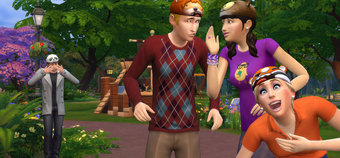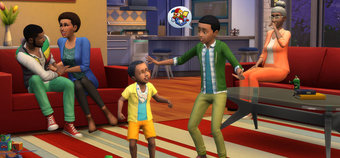For around the past month or so, on one of our more regular journeys, we've been sitting in a queue that stretches almost the entire length of the road at some (temporary) four way lights. Roadworks. Or should that just be "road", seeing as every time we've driven past, there's been no-one working on them. Causing a headache for everyone involved, these roadworks had been placed in the worst possible place, at the worst possible time, while the workmen seemingly were off working on something a lot more interesting. While sitting in the tailbacks, we imagine a few people were cursing the council under their breath. After all, how hard can it be to run a city, and keep everything moving? In Tropico 4, you can find out for yourself.
The closest you're likely to come to a Sim City style game on a console, Tropico 4 puts you in the benevolent boots of a dictator on a tropical island paradise. As the man (or woman) in charge, it's up to you to oversee practically every aspect of keeping the island running, and its residents happy. And that means you've got a lot to think about. You've got mouths to feed, and economy to run, and countless political factions to keep happy. Get it right, and you'll be the most popular presidente they've ever had. Mess up, and you'll have to deal with an uprising to get your power back.
Your first task, before you even get started on the nitty gritty of running the island, is to create your dictator. Not simply for show, your dictator can actually be found standing outside your presidential palace during the game - and moving them around either instils pride or fear in your people. You can even make building projects go faster by visiting the site. Choosing to be a man or a woman, there's a decent selection of options at your fingertips here, letting you be as serious, or as silly as you like - hence we ended up with our pipe smoking, monocle wearing, Abraham Lincoln-crossed-with-a-pirate. If you're not all that creatively inclined, you can always choose from a pre-created one, but it's often best to decide for yourself. Other than editing your new ruler's looks, you can also edit their history, rise to power, and "traits" - each of which comes with a variety of pluses and minuses that'll affect your standing with various factions. Choose "self made man" as your background, for example, and you'll be popular with the US and capitalists, while "Elected for family values" makes you more popular with tourists and the religious faction.
The main single player game's split into two sections - the sandbox mode, where you can basically customise an island and build away to your heart's content, and the "Campaign", which gives you a series of 20 missions, each with their own story and objectives. But far from every island effectively being a blank canvas, each mission brings with it its own set of strengths and weaknesses - while some islands have plenty of space, and lend themselves well to farming, on others, you'll have to base your economy around mining, or sometimes even tourism. With a story behind each mission (an American investor wants to invest in your island, if you can meet his production goals, or an islands recently been made independent from British rule, and as such, they have to pay a 20% tax on all exports), each level has enough structure to it that you only occasionally feel like you're on your own without a clue what to do. Which is important in a game as complex as Tropico.

There's a lot of potential in this land. And a lot of work to do. Best get to it.
Starting out with an island made out of a large presidential palace (naturally), and a few people living in shacks, who're all unanimously pretty unhappy with their quality of life, you'll be eager to at least start things moving. Luckily, on most levels, you also happen to start out with some basic infrastructure to help kick start your island - a construction yard, so you can actually build things, a teamsters office, so they can ferry goods back and forth, and a farm, which makes produce your people can eat, and that you can export around the world for profit. At least, that's the idea.

Tropico's radial menu. Makes finding building options easy.
While it may not take you by the hand and tell you exactly what to do, each level at least contains a fair few pointers. In most cases, what you'll want to do first is put a few farms down, in order to make sure you have enough food for your people, and some goods to export to help keep the money coming in. Accessed through a radial menu, there's a wide selection of options available to budding dictators in Tropico 4. Divided into categories like infrastructure, healthcare, and tourism, the build menu's fairly logically organised, making most things straightforward to find. Choose the building you want, find a decent place for it, and plonk it down, and your people will get to work building it. At the end of each month, a ship comes to take any exports away, in return for some much needed cash.
Once you've got a steady stream of income coming in, however, the options in Tropico start to open up a lot more. While the mission will usually dictate what you have to do, there are many means to an end, and plenty of ways to earn money. While a small economy can survive by exporting corn and bananas, if you really want your country to thrive (and you do - after all, you need to keep the people happy, lest they revolt), you'll want to set your eye on bigger and better things - but how you get there is up to you.
One option would be to increase the quality of the things you produce. Create a timber yard, and you'll be able to export wood, but build a furniture factory, and you'll be selling tables and chairs abroad instead, at a much higher price. The same goes for gold and silver - while you can happily mine away and make a decent profit, refining it into jewellery will get you a much higher price.
Of course, it's no good having all these fancy factories if you have no one to run them, and so attracting citizens to your country is of great importance. While your population does slowly grow as people have children, you can also open your doors to immigrants, providing a valuable pair of helping hands in the early days when labour's hard to come by. The more people you get, the more you'll be able to grow your economy - although sometimes, cheap labour isn't good enough, and you'll have to make an offer to bring in specialists from abroad. Whether it's a church, a health practice, or a university you're making, when you're faced with a chicken and egg scenario (who's going to teach the students if you've never had a university before), you'll often have to look for foreign help - which comes at a price, and one that's not only financial.
Keeping an entire populace easy is never an easy job - but as your country grows, your residents begin to diversify into factions, each of which is vying for political power - and each of which you have to try and keep happy. Presenting you with some tricky decisions, it's sometimes not entirely possible to keep both factions happy - keeping industrialists and environmentalists happy at the same time, for example, is rather tricky. As such, you can imagine the effect an open immigration policy has on your nationalists, who aren't best pleased at the foreigners flooding into your country.
Luckily, the political aspect of Tropico isn't as easy to manage as you may expect, and if you're doing a good job of running the land, the factions will usually all be at least mildly warm in their relations with you. What it usually does do, however, is edit your priorities somewhat. Whilst you may think your citizens need a new hospital, if the religious faction holds the most influence on your island, and are breathing down your neck demanding money for a new cathedral, you may have to plug some money in the direction of the church to keep them happy.

You can even build statues of yourself, just remind yourself how great you are.
Unlike other, more complex management games like Sim City, town planning in Tropico 4 is actually fairly basic. While you may imagine you ought to split your town pretty much down the middle, with an industrial part, and a residential part, so your residents aren't living in the smog of the factories, it actually doesn't seem to affect their happiness all that much. At one point, we built a zoo next to a nuclear reactor, but people still happily came and browsed the zoo, and the animals (disappointingly) didn't start sprouting extra limbs. Seemingly letting you put anything wherever you want, there doesn't have to be any rhyme or reason to where you build things in Tropico - so while you may think those seafront bungalows may command a pretty penny, you may end up disappointed with the rate they actually get. So long as you've built a decent amount of police stations, and rubbish disposal dumps, your people aren't all that fussy wherever they live.
What they do care about, though, is having a bit of variety in their life. Each person has their own individual wants and needs, and although you can click on a person to find out exactly how they feel, there's also a general overview available that tells you how everyone's feeling, and helps make those executive decisions that are so important to your dictatorship. Once you've lifted them out of poverty, your people will start getting more demanding - wanting entertainment, a variety of food, good eateries, schools, healthcare, quality churches, etc, meaning it's never a simple case of building loads of farms and making loads of money - it's a case of balancing your people's needs with your financial (or other) objectives.
Luckily, though, with you being a dictator and all, you can act however you want. If you want to be a nice, friendly dictator, you can try your best to keep everyone happy. At the other end of the scale, if there's a particular dissenter you want, er, "removed", you can order an assassination, and build up your army to remind the proles of their place. If at any time things start going the wrong way, though, you do have options other than murder to resort to. At any time, El Presidente can also issue a number of Edicts, to try and help tip things back in his favour. From book burnings to same-sex marriages, and Mardi Gras, each of these edicts affects your relationship with the factions differently (luckily, like most things in the game, they tell you exactly how they'll affect your relationship before you choose them), giving you a lifeline if it looks like everything's going pear shaped.
As you play through each mission, you'll receive option objectives from random characters in the game. Sometimes, the British will want you to export more bananas to them, sometimes you'll receive a donation from a religious group that you're intended to put towards a church (but can spend however you want), and at other times, you'll get the Russians or Chinese asking for a donation, in return for staying in their favour. Whilst most of these missions simply give you an extra thing to think about, and a nice financial reward at the end of it, others affect your standing with the various factions or countries dramatically, as acting in favour of one is often acting against another, cue a minor political incident. Whatever you do, just be careful you don't offend any of the major countries too much - the US, and the USSR are rather partial to an invasion if they think you're trying to usurp their power.
But it's not just foreign powers you'll have to worry about when building your island, as a much more deadly, and non-diplomatic power can rear its head at any moment and cause chaos far beyond any invasion - a force called Mother Nature. With these islands being tropical, storms, earthquakes, and even volcanoes abound, which can rear their ugly heads at any moment, tearing a hole through your once prosperous city. Although you'll be sent foreign aid to help rebuild things, you'll also have to think twice about building anything in the path of the volcano (even though the ground's often really flat and fertile near it - and therefore perfect for farming), as the lava sets fire to practically everything in its path - whilst there's nothing you can really do to defend against tornadoes and earthquakes.

Disaster!
As you can probably tell by now, Tropico 4's a game with a lot of different aspects, all of which need attention and balancing if you want to keep things running smoothly - and sadly, this is where the game really falls down. It's not so much the interface that's the problem - games like this are always challenging on a console thanks to the lack of buttons, and lack of a mouse (which makes you wonder why there aren't more of them on the Wii), but Tropico 4 handles itself pretty well. Instead, it's the range of menu options that lets it down.
When you choose to construct a building, there'll be a rudimentary pile of planks where it's going to be built, while you're waiting for your construction team to start putting it altogether. The only problem is, there's nothing to tell you when the construction team will arrive, or why they're not there building it now, leaving you sitting there, sometimes for months (of in game time), without any clue as to why your construction team aren't doing their job. Head over to the construction team shack, and you'll see it's running at full capacity in terms of employment, yet has no jobs in progress. So they're all just sitting around doing nothing. Obviously, there's some limiting factor at work here, but we have no idea what.
Sadly, it's the same when it comes to every other aspect of the game. We want to make sure we have enough food to cover our people before we start importing it, but there's no bar telling us how much we need to cover the populace. We want to make sure we're providing enough electricity, but we've got the same problem. For practically everything you need to manage, there's nothing telling you how much of that particular resource you ideally need to have your island run properly - so you just end up having to guess, and waste time, trying to work out what's going wrong.
A similar problem happened when it came to providing housing. We built several apartment blocks, yet we had forty or more shanties all over the island, where people were living in poverty. Clicking on the building, we could see that under half the slots were full. Maybe they couldn't afford it, we reasoned, so we lowered the price to a single dollar - and still the apartments stayed half empty. Clicking on one of the shanty residents, we could see they were earning $10. One was a university professor. So why were they still in the shanty? It turns out, the apartment block has a number of rooms, and people are more willing to live in a shanty than they are to share a room with someone - hence it appearing that the apartment's half empty, as people either don't have kids, or are living on their own. Again, with nothing to explain this, or tell us what the limiting factor was, we were stumped for ages - which gets more than a little bit frustrating when you think you're doing everything right, but things just aren't happening.
All of which is a crying shame, because otherwise, Tropico 4's a really enjoyable game. Something of a rare breed nowadays, as a game that isn't a shooter, but instead is a more slow paced, strategy game on a console, Tropico 4's the sort of game that we really need more of. Something to add a bit of variety to our lives. But without the ability to tell how well your island's running, without knowing what limiting factors are getting in the way of your progress, and when you've got to sit around for ages waiting for construction to begin on buildings that, for all intents and purposes, should be together already, things are just that bit more frustrating than they really should be.
If they can put a new, easier to use interface together for Tropico 5, though, we'll be dusting off our dictator moustache quicker than you can say El Presidente.
Format Reviewed: Xbox 360






















